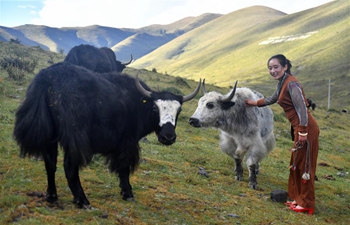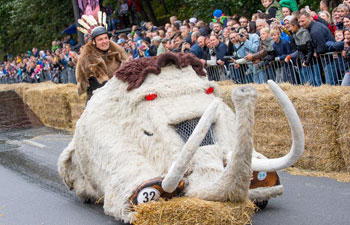by Peter Mertz
CARBONDALE, the United States, Sept. 16 (Xinhua) -- A low whistle pierced the crisp, early morning air as the sun rose slowly over America's Rocky Mountains - the sound of sheep dog handler Bridget Strang - directing her dog Ben at the national sheepdog championships.
This weekend on the Strang Ranch outside of the tiny town of Carbondale in the U.S. state of Colorado, 200 of the smartest, fastest dogs in the country competed to see which one could most quickly and efficiently capture and corral a small herd of sheep, in the annual United States Border Collie Handler Association (USBCHA) finals.
One by one, the handlers took their dogs into a huge field, where their whistles instructed their 40-pound canine competitor to move small groups of 200-pound sheep into a corral - in a contest that dates back more than 100 years.
Cowboys are routinely depicted as rugged, hard-working, lowly-paid ranch hands who settled in the dangerous west in the late 1880s - who embody American spirit and culture.
But what about the American sheepherder? This unsung hero was also grazing livestock on the vast fields of America's west, back when the "Wild West" was settled.
In 1884, the numbers of sheep peaked in America with 51 million head - and the Centennial State, today with 19 mountain peaks called Sheep Mountain - had millions of sheep grazing its pastures, back in the day.
With one sheepherder regularly sheepherding 300 or more sheep, the job would have been impossible without the work of sheepherding dogs, who still move sheep to this day.
The first sheepdog trial took place in 1876 in England, and America followed suit at the 1880 Centennial Year Celebration in the east coast state of Pennsylvania.
Today, more than two-thirds of U.S. sheep operations are located in the Southern Plains, Mountain, and Pacific regions, according to the U.S. Department of Agriculture (USDA).
"Border Collies are ranch hands - they are bred for their brains and to be keen on stock, and they take the place of 8-10 men," said Stephanie Summers, a California Border Collie handler, trainer, and teacher, whose three female dogs competed in the finals.
The United States has 5.23 million head of sheep, according to 2018 USDA statistics, and without the help of Border Collies, the industry would be crippled by additional costs.
"One dog can do the work of several cowboys - it's a lot less expensive," said Emil Luedecke, president of the American Border Collie Association (ABCA), who has been a Texas sheepdog finals competitor for almost 30 years.
Unlike rodeo events, where competitors can make a living, prize money at sheepherding events is miniscule, and competitors must often rely on other ways to make ends meet.
On Sunday, Summers was multitasking - not just running her dogs in several different sheep herding events - but making money as one of a number of vendors at the finals.
In fact, the small, closely knit Border Collie sheepherding community has many vendors and officials who also run their dogs as handlers.
"This is a humane sport - it is a family sport, both men and their wives can do it, and teenagers are good as well," said Luedecke, 71, whose Border Collie Zac competed on Thursday.
In the United States, most dog handlers are women, but in England and Scotland where Border Collies first appeared as sheepherders in the early 1800s, most modern handlers are men, according to Summers.
And most handlers are not youthful - averaging 40-60 years in age.
"It is something you cannot learn overnight - you have to learn your stock, and your dogs and what the combination of the two will produce," Luedecke told Xinhua.
While the Carbondale crowd was small, numbering in the hundreds, the atmosphere was similar to a western rodeo, with American ranchers filling the audience.
"I grew up on a farm in East Tennessee - so being here at the sheepdog finals is just like being on the farm," said attendee Sarah Murr.
"This is such a unique event - because you get to see how much work goes into the handlers with their dogs," she told Xinhua.
"Sheep dogs have been around part of our country for a long time - they give us economic value and they give us a chance to create a relationship between animal and man," said Emily Geraci, 27, a Border Collie owner and local resident who attended the five-day event.













